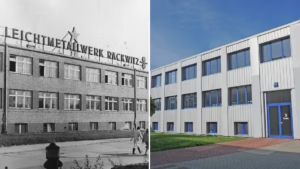Ulrich Wolf
Dresden/Leipzig. Die Bundesnetzagentur hat den Aufbau eines zentralen Wasserstoffleitungsnetzes genehmigt. Die sächsischen Kommunen Dresden, Leipzig und Meißen gehören zu den Startregionen. Perspektivisch sollen dann die Lausitz und Zwickau angebunden werden. Der Aufbau des Kernnetzes soll bis 2032 größtenteils abgeschlossen sein und rund 19 Milliarden Euro kosten.
Sachsens Wirtschaftsminister Martin Dulig (SPD) bezeichnete den Aufbau des Wasserstoffnetzes als „positives Signal für den Wirtschaftsstandort Sachsen“. Erste energieintensive Unternehmen könnten somit ihre Energieversorgung zukünftig auch mit Wasserstoff sichern. Mit dem Beschluss der Bundesnetzagentur bestehe nun Planungssicherheit.
Es entsteht das größte und leistungsstärkste Wasserstoff-Pipelinesystem der Welt
Martin Dulig, sächsischer Wirtschaftsminister
Dulig zufolge sollen rund 9.000 Kilometer „zeitnah“ gebaut werden. Es entstehe das größte und leistungsstärkste Wasserstoff-Pipelinesystem der Welt. Es werde zudem „das Rückgrat für den Aufbau des europäischen Wasserstoffnetzes“. Übergangspunkte zu Nachbarländern seien in der Planung vorgesehen.
Sachsens Energieminister Wolfram Günther (Bündnis 90/Grüne) bezeichnete die Regionen Leipzig und Meißen als „echte Leuchttürme vom Kernnetz“. Die Wasserstoffwirtschaft sei „eine riesige wirtschaftliche Chance für Sachsen und von enormer strategischer Bedeutung“.
Der sächsische Bundestagsabgeordnete Bernhard Herrmann (Bündnis 90/Grüne) sagte, das Bundeswirtschaftsministerium und die Netzagentur hätten „in einer Rekordgeschwindigkeit von zweieinhalb Jahren das auf die Beine“ gestellt, „wovon die CDU jahrelang nur geredet hat“.
Federführend bei der Umsetzung ist das Leipziger Unternehmen Ontras Gastransport GmbH, eine Tochterfirma der Verbundnetz Gas AG (VNG). Ontras-Manager Ralph Bake sagte, mit dem Wasserstoffnetz werde „ein substanzieller Beitrag zur Dekarbonisierung der Industrie“ geleistet. VNG-Vorstand Hans-Joachim Polk betonte, die Beteiligung am Wasserstoffkernnetz sei für VNG die größte Einzelinvestition in der über 65-jährigen Unternehmensgeschichte.
Zunächst entstünden rund 600 Kilometer Wasserstofftransportleitungen in Mitteldeutschland, hieß es von Ontras. Rund 80 Prozent davon erfolge durch die Umstellung bestehender Gasleitungen, der Rest müsse neu gebaut werden. Zunächst werde die Verbindung der Region Leipzig mit dem mitteldeutschen Chemiedreieck, dem Berliner Raum sowie dem Industriebogen Meißen hergestellt. Als erster Kunde sei für 2025 die Total Energies Raffinerie in Leuna vorgesehen,
Ein weiterer Partner in dem Projekt sind Sachsen-Netze in Dresden. Deren Chef Steffen Heine sagte, mit den Wasserstoff-Anbindungen würden vor allem die Unternehmen im Industriebogen Meißen, Kraft- und Heizwerke sowie Großkunden im Norden von Dresden und den umliegenden Kommunen erschlossen. Der Investitionsumfang betrage hier vorerst insgesamt rund 100 Millionen Euro. Man könne nun die Umstellung des eigenen Gasnetzes konkreter planen. Die sukzessive Umstellung der regionale Verteilnetze auf Wasserstoff soll von 2032 bis 2045 geschehen.








